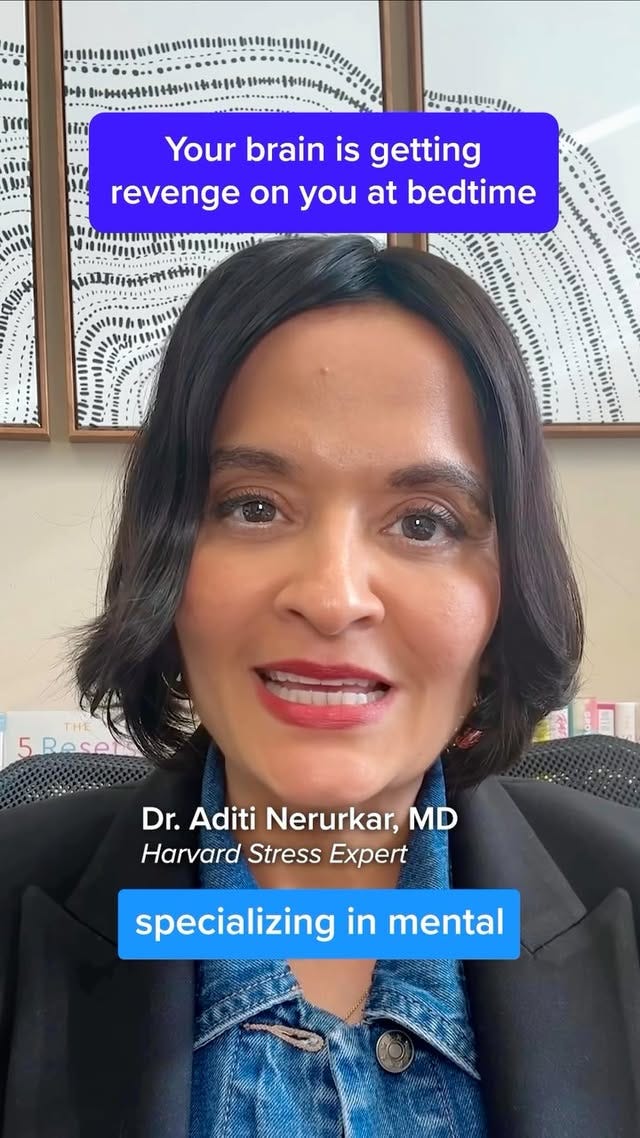“Just one more scroll…” turns into “Why am I still awake?”
Revenge bedtime procrastination is the growing cultural phenomenon where you stay up late scrolling, watching TV, or doing just about anything except sleeping– even when you know you’ll regret it in the morning. Why? Because your day feels so packed that nighttime becomes the only time you have for yourself. A brief moment of respite from a day filled with the impossible demands and expectations of others on your time, energy and attention.
Simply put, revenge bedtime procrastination is a manifestation of our hustle culture and deeply tied to the ethos of toxic resilience. According to cognitive neuroscientist Lauren Whitehurst, “We value productivity so much that we pack our days. It’s really a kind of commentary on [our lack of down time].”
The Science Behind Revenge Bedtime Procrastination:
When you’re overstimulated throughout the day, with emails, meetings, parenting, and the relentless pace of modern life, your brain craves control. For many of us, every minute is accounted for, and often you’re on someone else’s schedule. But those glorious evening hours are yours and yours alone, to do whatever you want! That’s a lot of power. So you stay up late as a form of “revenge” for your challenging days. Late night scrolling might feel like freedom, but it’s actually stress disguised as relaxation. It isn’t real rest because ‘mindless’ scrolling is a myth. It appears to be a passive process, but it has a profoundly active effect on your brain and your biology of stress. Your nervous system stays on high alert,making it harder to wind down. The result? Suboptimal sleep, low energy, a defeated sense of personal agency, and stress that just won’t quit.
Surprisingly, the greatest driver of revenge bedtime procrastination isn’t a gap in knowledge or information– we all know sleep is good for us– it’s a gap in action. In one study of 300 patients, people who engaged in bedtime procrastination understood the importance of sleep but still couldn’t manage to get to bed earlier. The researchers surmised, “We found that the majority of participants agreed that sleep is important. On one hand, this is fantastic because it means we do not have to convince people why sleep is essential. On the other hand, it suggests sleep loss is more complicated than a matter of motivation.”
These findings align with my own clinical experience. Nearly every patient I’ve helped with sleep deprivation wants to get to bed earlier, but for a myriad of reasons, they can’t or won’t.
Breaking the cycle of bad sleep habits can seem daunting, but it’s not impossible.
How do you know if you’re a revenge bedtime procrastinator? Ask yourself these questions: Do I stay up late to watch “just one more episode”? Are you utterly exhausted, but just can’t stop scrolling? Do you wake up in the morning feeling groggy and defeated, wondering why you stayed up until 2AM again?
Whether you said “yes” to one or all of the above questions, it’s important to know that revenge bedtime procrastination is reversible and can be cured.The fix? Small, science-backed resets that actually work.
✨ Set a non-negotiable wind-down alarm 30 minutes before your ideal bedtime. (You have a morning alarm, why not a bedtime alarm too.)
✨ Keep your phone off your nightstand and across the room. Out of reach = harder to scroll
✨ Turn your phone to grayscale mode. Change your phone display from color to black and white. Studies show that grayscaling your phone makes scrolling less enticing and ‘addictive’ (a deeper dive and video tutorial into this next week!)
✨ Swap screens for something analog, like reading or journaling. Science has found that reading before bed promotes relaxation for a myriad of reasons like slower, deeper, more regulated breathing.
This week’s stress reset: Try this tonight. Set a bedtime alarm between 9pm- 10pm. Wind down by putting your phone away 30 minutes earlier than usual. Instead of scrolling, try reading, listening to relaxing music or doing some gentle stretches. Your stressed brain will thank you for prioritizing a more restful bedtime routine and better sleep habits. Because rest isn’t a nice to have luxury for your brain and body, it’s a biological necessity.
Until next week,
Join me LIVE: Your burning mental health questions, answered by me! Join me live every Thursday in May at 12pm EST on Substack for a Q & A. Send me your questions in the comments or reply to this email and I’ll answer them live. If you have a friend or family member struggling with stress or mental health, share this newsletter as a resource. Let’s support one another through this difficult time.





